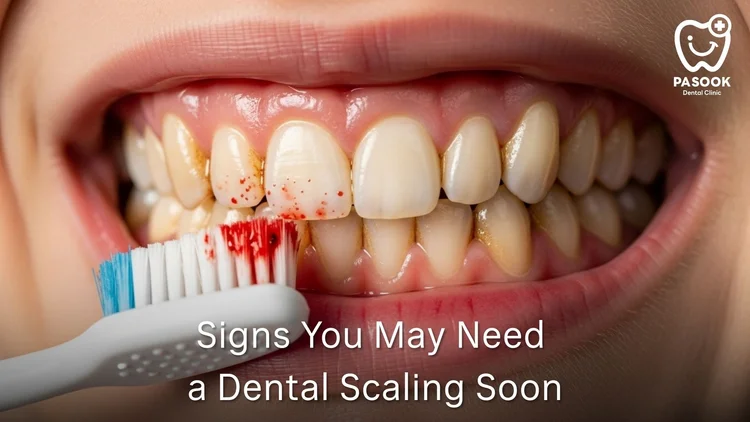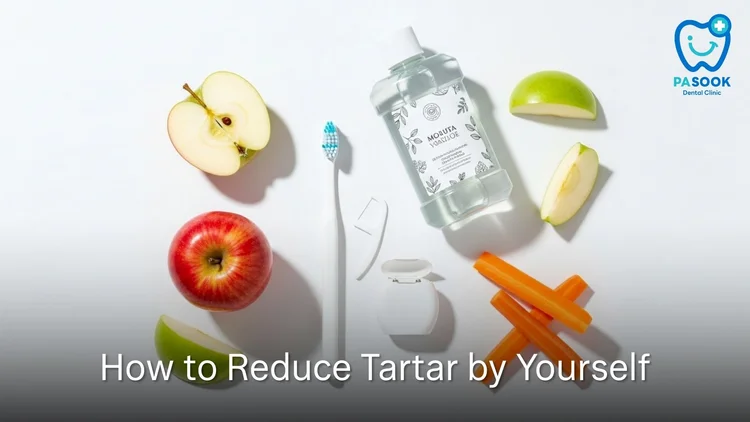Bleeding Gums and Bad Breath? Time for a Dental Scaling

Bleeding Gums? Bad Breath? It Could Be Time for a Dental Scaling

Tartar might seem like a minor issue, but in reality, its the root cause of many oral health problems that can get worse over time. If left untreated, tartar buildup can lead to gum inflammation, gum recession, or even tooth loss in the future.
Many people dont realize that tartar starts forming even before any symptoms appear. And once it hardens, brushing alone wont be enough to remove it. Thats why regular dental scaling is such an important part of preventive oral care.
If youve noticed early signs like swollen gums, bleeding when brushing, or persistent bad breath, it might be time to visit your dentist for a check-up. You could have hidden tartar buildup that needs professional carebefore it turns into something more serious.

Table of Contents
2.Why Should You Get Dental Scaling and How Often?
3.Signs You May Need a Dental Scaling Soon
4.How to Reduce Tartar by Yourself
5.How to Care for Your Teeth After Dental Scaling?
6.Common Myths About Dental Scaling
7.How Dental Scaling Benefits Your Overall Health
8.Dental Scaling as a Long-Term Investment in Oral Health
What Is Dental Scaling?
Dental scaling is a professional dental procedure that removes plaque and tartar (also known as calculus) from the surface of your teethespecially along the gumline and beneath the gums. These hard deposits, if left untreated, can lead to gum disease, receding gums, loose teeth, and persistent bad breath.
Dentists use specialized tools for this procedure. These include traditional manual scalers and modern ultrasonic scalers, which use high-frequency vibrations to break up tartar more efficiently. Ultrasonic scaling tends to be faster, less uncomfortable, and more effective than manual methods.
Two Main Types of Tartar
- Supragingival Calculus: This type of tartar forms above the gumline and is usually visible on the surface of the teeth.
- Subgingival Calculus: This builds up below the gumline, deep in the gum pockets. Its often the main cause of periodontal disease, which affects the tissues around the tooth roots.
If not properly removed, both types of tartar can continue to accumulate, leading to gum inflammation (gingivitis) and potentially progressing into serious gum disease (periodontitis).

Why Dental Scaling Is Important and How Often You Should Get It
Key Benefits of Dental Scaling:
- Prevents gum diseases, gum recession, loose teeth, and even tooth loss
- Reduces bad breath caused by tartar buildup
- Helps gums become healthier and firmer
- Lowers the risk of tooth decay around the gumline
Is There Scientific Evidence?
Yes. According to a study published in the Cochrane Review, regular dental scaling and polishing significantly reduce bacterial plaque and gum bleeding.
Reference: Cochrane Library Periodontal Maintenance
In addition, the American Dental Association (ADA) recommends that the general public get their teeth checked and professionally cleaned at least every 6 months.
How Often Should You Get a Dental Scaling?
- Most people: Every 6 months
- Patients with gum disease: Every 3-4 months, as advised by your dentist
- High-risk individuals (e.g. smokers, diabetics): Should have more frequent check-ups to monitor and manage their oral health

Signs You May Need a Dental Scaling Soon
Tartar buildup often goes unnoticeduntil your mouth starts to show these warning signs:
- Swollen, red, or bleeding gums while brushing
- Hard white or yellowish deposits on teeth that dont come off with regular brushing (often mistaken for normal stains)
- Persistent bad breath despite good oral hygiene
- Loose teeth or a feeling that your teeth arent firmly in place
- Gum recession, exposing more of the tooth root
- Pain while chewing or gum tenderness, especially on one side
If you notice any of these symptoms, its time to schedule a dental check-up and cleaning. Ignoring them may lead to serious gum disease and tooth loss in the long term.

How to Reduce Tartar by Yourself
While you cant completely remove tartar by yourself, you can slow down its formation and maintain healthy gums with these everyday habits:
What to Do:
- Brush your teeth twice a day using a soft-bristled toothbrush and fluoride toothpaste
- Floss daily, or use an interdental brush to clean between teeth
- Use an antibacterial mouthwash, preferably one containing chlorhexidine
- Eat crunchy, high-fiber foods like carrots or apples they help naturally scrub your teeth
- Drink plenty of water to support saliva flow, which helps wash away bacteria
What to Avoid:
- Smoking or using tobacco
- Frequent consumption of sugary or acidic drinks
- Rushing your brushing or missing hard-to-reach areas
Good daily dental care helps reduce tartar buildup, lowers your risk of gum disease, and may even save you money on dental treatments in the long run.

Tips for Taking Care of Your Teeth After Dental Scaling
After dental scaling, you might feel some tooth sensitivity or mild gum soreness for 12 days. Here are some tips on what to do and what to avoid during this time:
What to Do:
- Rinse your mouth with warm salt water 2-3 times a day to reduce inflammation
- Avoid very hot or cold foods and drinks for the first 24 hours
- Use toothpaste designed for sensitive teeth
- If you feel pain, you can take pain relievers like acetaminophen (paracetamol)
- Brush gently using a soft-bristled toothbrush
- Follow your dentists instructions if they prescribe any antiseptic gels or medications
Important Reminder
Avoid alcohol and smoking for 1-2 days after the treatment
Dont forget to go back for your follow-up appointment, as your dentist may need to check your gums or perform another scaling session if necessary.

Common Myths About Dental Scaling
Although dental scaling is a basic procedure recommended by dentists, many people still avoid or fear it due to misunderstandings passed down without scientific evidence. Lets clear up some of the most common myths about dental scaling:
Myth 1: Frequent scaling wears down your teeth
Truth: The tools used for scaling are designed to specifically remove tartar without damaging your enamel or tooth structure. When done by an experienced dentist, scaling does not wear down your teeth.
Myth 2: Scaling causes gum recession
Truth: Gum recession is not caused by scaling. It happens because tartar buildup pushes and inflames the gums. When tartar is removed, the gums may reveal more of the tooth root that was previously hidden, which some mistake as recession caused by scaling.
Myth 3: Scaling makes teeth loose
Truth: Loose teeth are usually a symptom of periodontal disease that has damaged the bone around the teeth. Scaling removes tartar that may have been holding the teeth in place artificially, revealing the true condition. This helps identify problems early, not make them worse.
Myth 4: If it doesnt hurt, you dont need scaling
Truth: Gum disease often develops without pain in its early stages. Waiting until you feel pain is often too late. Regular dental checkups and scaling are the best prevention.
Myth 5: Anti-tartar toothpaste means you dont need scaling
Truth: Anti-tartar toothpaste helps reduce plaque formation but cannot remove hardened tartar. Professional scaling is still necessary to fully clean your teeth.
How Dental Scaling Benefits Your Overall Health
Beyond improving oral health, dental scaling is linked to overall well-being, supported by multiple studies:
- Managing periodontal disease can help control blood sugar levels in diabetic patients.
- It may reduce the risk of cardiovascular diseases since oral bacteria can enter the bloodstream and trigger inflammation in blood vessels.
- Research from the Mayo Clinic shows a connection between gum disease and pregnancy complications, such as preterm birth.
Therefore, dental scaling is not just about keeping your mouth cleanits an important part of holistic health care.
Dental Scaling: A Long-Term Investment in Your Oral Health
Dental scaling isnt just about surface cleanliness. Its a crucial step in preventing gum disease, tooth decay, and the silent loss of teethissues many people overlook. Taking care of your oral health starts simply by visiting your dentist regularly.
Remember, oral health is a key part of your overall health and even your long-term financial well-being.
If you have any questions or want to consult a specialist, PASOOK Dental Clinic is ready to be your trusted dental care partner, providing precise advice and quality service.


